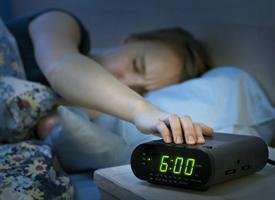Earlier school start times may increase risk of adolescent depression and anxiety

Teenagers with school starting times before 8:30 a.m. may be at particular risk of experiencing depression and anxiety due to compromised sleep quality, according to a recent URMC study.
Led by URMC clinical assistant professor in Psychiatry Jack Peltz, Ph.D., the study, recently published in Sleep Health, not only reinforces the theorized link between sleep and adolescent mental health, but is among the first to demonstrate that school start times may have a critical impact on adolescent sleep and daily functioning. The findings provide additional evidence in the national debate over how school start times impact adolescent health.
"Our study is consistent with a growing body of research demonstrating the close connection between sleep hygiene and adolescent mental health," says Peltz, who is also on the faculty of Daemon College in Amherst, N.Y. "But ours is the first to really look at how school start times affect sleep quality, even when a teen is doing everything else right to get a good night's sleep. While there are other variables that need to be explored, our findings show that earlier school start times seem to put more pressure on the sleep process and increase mental health symptoms, while later school start times appear to be a strong protective factor for teens."
For adolescents, good sleep hygiene includes avoiding caffeinated beverages after 6 p.m., turning off phones and electronic devices before bedtime, maintaining a consistent sleep schedule, and getting between eight and 10 hours of sleep.
Peltz is one of many investigators now exploring ways to address what has become a nationwide sleep epidemic among adolescents. About 90 percent of high-school-aged adolescents get insufficient sleep on school nights, or barely meet the required amount of sleep (eight–10 hours) needed for healthy functioning. School start times, among other interventions (ie. limiting electronic use before bedtime), have become a critical point of interest.
The research to date, however, has primarily focused on the academic benefits of delaying school start times for adolescents, rather than examining how earlier start times may disrupt sleep-related processes and affect mental health outcomes, says Peltz.
"Looking at school start times as a larger contextual variable that may moderate sleep hygiene, sleep quality and adolescent functioning, fills an important gap in the literature," he says.

With the help of a grant from the National Sleep Foundation, Peltz' and his co-authors used an online tool to collect data from 197 students across the country between the ages of 14 and 17. All children and parents completed a baseline survey that included questions about the child's level of sleep hygiene, family socioeconomic status, their circadian chronotype (roughly, whether you are a "morning person" or "night person"), and their school start times. They were separated into two groups: those who started school before 8:30 a.m. and those who started after 8:30 a.m. (which is currently the recommended start time for high schoolers by the American Academy of Pediatricians).
Over a period of seven days, the students were instructed to keep a sleep diary, in which they reported specifically on their daily sleep hygiene, levels of sleep quality and duration, and their depressive/anxiety symptoms.
The results showed that good baseline sleep hygiene was directly associated with lower average daily depressive/anxiety symptoms across all students, and the levels were even lower in students with school start times after 8:30. However, students with good baseline sleep hygiene and earlier school start times had higher average daily depressive/anxiety symptoms.
"Our results suggest that good sleep hygiene practices are advantageous to students no matter when they go to school," says Peltz. "Maintaining a consistent bedtime, getting between eight and 10 hours of sleep, limiting caffeine, turning off the TV, cell phone and video games before bed… these efforts will all benefit their quality of sleep and mental health. However, the fact that school start times showed a moderating effect on mental health symptoms, suggests that better sleep hygiene combined with later school start times would yield better outcomes."
Peltz says one possible explanation for the difference may be that "earlier starting students" have more pressure on them to get high quality sleep, or there may be other aspects of the school environment that vary by start time that may trigger their depression/anxiety symptoms. Peltz says there may be other lifestyle changes that coincide with earlier start times as well (for example, morning nutrition or exercise) that require closer scrutiny.
"More studies are definitely needed, but our results help clarify the somewhat mixed findings with other sleep hygiene-focused interventions, by suggesting that school start times may be a very important contextual factor," he says.
Peltz hopes the evolving evidence in this area will help propel more concrete national sleep hygiene recommendations for children and teens, similar to what the American Dental Association recommends for oral health.
"If we don't sleep, eventually we will die…our brains will cease to function," he says. "At the end of the day, sleep is fundamental to our survival. But if you have to cram for a test or have an important paper due, it's one of the first things to go by the wayside, although that shouldn't be."
More information: Jennifer M. Bowers et al. Effects of school start time on students' sleep duration, daytime sleepiness, and attendance: a meta-analysis, Sleep Health (2017). DOI: 10.1016/j.sleh.2017.08.004



















